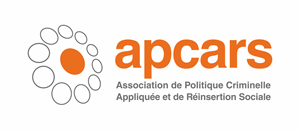For many years, our association, whose action is placed midway between judicial and societal, observes the daily functioning of justice, from the court trial to release from prison, and seeks to humanize and improve it.
We have continually been astounded by the lack of information, exchange, and coordination between the different professionals that intervene for the same individual.
As an example, communication between the justice and health professionals is not easy, namely because of the obstacle created by medical confidentiality. In addition, the justice system has difficulty reintegrating convicted persons in society by lack of time and means needed to develop and maintain partnerships with public interest structures, and namely reintegration associations.
Given this situation, APCARS develops new forms of responses that aim to facilitate the link between justice and society, in closed and open environments. These projects have been able to be initiated through the support of the Paris Regional High Court, the Prefecture, and the municipal government.
Social work and housing for the prevention of delinquency
In 2007, we launched a project to help drug addicts, principally crack addicts and multi-users, with a long history of substance addiction. The justice system was then without means to handle these situations of human distress, frequently sources of delinquency as their compulsory treatment often remained ineffective. Through our social intervention, we have doubled the number of drug addicts who engage rehabilitation (40 to 80%), reduced the risk of recidivism, and helped preserve tranquility in the Paris neighborhoods.
Since 2008, we have initiated a pilot program of un-sharing the household for spouses suspected for violence who are under judicial control. Some of these people do not have an alternative housing solution because of lack of resources or family able to house them; they end up on the street or return to their former home in violation of the judicial control order. We have therefore offered them housing and social care until the trial date. Indirectly, this allows a grace period for the victim to stay in their home and the possibility for children to stay in the same school. Directly, and since its start, our action achieves an effective distancing of the suspected violent person.
As of this year, in the case of a plea bargain hearing, we offer social care and an immediate housing solution if the offender is homeless and is left to go free. In fact, our partners recognize that in many cases the lack of a residence is a factor that increases the risk of being sentenced to prison. By our efforts, 40 persons per year avoid being systematically sentenced to prison and serve their sentence outside the prison walls, with a viable reintegration project.
The efficiency and speed of judicial sentence execution relies mainly on the means that the judges dispose of locally to implement them.
As a mandated association and historical partner of the penal justice system, we will continue to improve this efficiency, in the interest of the offenders, victims, and in general, society-at-large.


